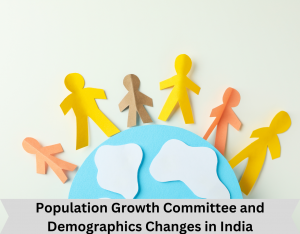ForumIAS announcing GS Foundation Program for UPSC CSE 2025-26 from 19 April. Click Here for more information.
ForumIAS Answer Writing Focus Group (AWFG) for Mains 2024 commencing from 24th June 2024. The Entrance Test for the program will be held on 28th April 2024 at 9 AM. To know more about the program visit: https://forumias.com/blog/awfg2024
Source: The post demographics changes in India has been created, based on the article “Population growth committee: Move beyond Emergency-era fears” published in “Indian Express” on 6th February 2024.
UPSC Syllabus Topic: GS paper 1- Society- population and associated issues.
News: The article is about India’s Finance Minister Nirmala Sitharaman announcing a committee in her 2024 budget speech to study India’s population growth. This is to help meet the Viksit Bharat goal by 2047. Population Growth Committee and Demographics Changes in India.
What is The Status of Demographics Changes in India?
Population Growth: The fertility rate in India has reached a level where two parents are being replaced by two children, indicating a significant decline.
Workforce Changes: Data shows that 33% of India’s population is aged 20-29 in 2024, but by 2047, the proportion of younger and older working-age populations will both be around 28%.
State Variations: In 2021, in Bihar, 44 working-age adults supported 100 dependents, while in Tamil Nadu, 50 adults supported the same. By 2051, this is expected to change to 47 adults in Bihar and only 24 in Tamil Nadu.
Women in Workforce: A study showed that in 1993, women spent about 14 years in childcare, which reduced to eight years by 2021. Yet, this hasn’t led to a higher rate of women in the workforce.
What are The Challenges of Demographics Changes in India?
State-Specific Demographic Shifts: In states like Bihar and Tamil Nadu, demographic changes are distinct. In 2021, Bihar had 44 working-age adults supporting 100 dependents, compared to 50 in Tamil Nadu. This will drastically change by 2051, with implications for economic support.
Underutilized Female Workforce: Despite the decrease in childcare time (from 14 to 8 years since 1993), women’s increased participation in the workforce hasn’t materialized, missing the chance to turn a demographic dividend into a gender dividend.
Resource Allocation by the 16th Finance Commission: The Commission will need to address the varied demographic changes and dependencies across different states, impacting inter-state resource distribution.
Read More UPSC Topics-
| India’s model BITs – Bilateral agreements |
| Plan to combat air pollution – Breathing bad |
What Should be Done?
Multidisciplinary Approach: Engage demographers, economists, sociologists, and public policy experts to address the diverse and complex challenges of demographic changes.
Invest in Workforce Skills: To prepare for a future with more middle-aged workers, India needs to focus on skill development and training, especially for those already in the workforce.
Boost Women’s Labor Market Participation: To convert the demographic dividend into a gender dividend, there should be an increase in women’s workforce participation. It can be done, possibly by improving childcare facilities through programs like Anganwadi and MGNREGA.
Prepare for Aging Population: Policies should be developed to make the elderly more self-sustaining, such as raising retirement ages and enhancing old age pension schemes.
Natural Fertility Decline: India should avoid strict population control like China’s one-child policy. Instead, it should let the fertility rate naturally decrease and adapt to demographic changes.
Resource Distribution: 16th Finance Commission should focus on allocating resources based on the varying demographic needs and challenges of different states.
Question for practice:
Examine the key demographic challenges of India’s population growth and the proposed strategies to address them.





